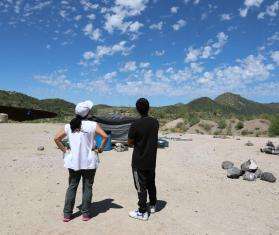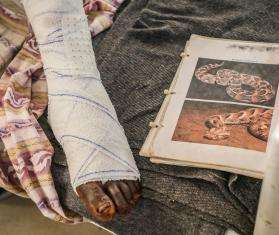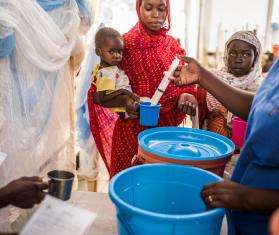PORT SUDAN/DARFUR, SUDAN, August 27, 2024 — Today marks 500 days of a dire humanitarian crisis brought on by the war in Sudan. This is a shameful moment for international humanitarian organizations and donors, who for over 16 months have failed to provide an adequate response to the country’s escalating medical needs, from catastrophic child malnutrition to widespread disease outbreaks.
Heavy restrictions on the movement of supplies and personnel imposed by both warring parties have drastically limited the capacity of organizations delivering aid, including Doctors Without Borders/Médecins Sans Frontières (MSF).
Fighting between the Rapid Support Forces (RSF) and the Sudanese Armed Forces (SAF) started in the capital, Khartoum, on April 15, 2023 and has been raging across the country since then. The conflict has triggered an unprecedented humanitarian crisis in Sudan, leaving tens of thousands of people killed or injured. Between April 2023 and June 2024, MSF treated 11,985 war-wounded patients at supported hospitals. The violence has created the world’s largest displacement crisis: Over 10 million people—1 in 5 people in Sudan—have been forced to flee their homes, according to the UN, and many have been displaced multiple times.

Malnutrition on the rise
As political solutions to the crisis are not forthcoming, malnutrition is rising amid increasing food prices and a lack of humanitarian supplies. A catastrophic malnutrition crisis is taking place in North Darfur’s Zamzam camp, and MSF’s inpatient therapeutic feeding centers in other parts of Darfur including El Geneina, Nyala, and Rokero are full of patients. The same applies to refugee camps where we operate in eastern Chad. Between the onset of the war and June 2024, we treated 34,751 acutely malnourished children in Sudan.
"Today children are dying of malnutrition across Sudan,” said Tuna Turkmen, MSF emergency coordinator in Darfur. “The help they most urgently need is barely coming and, when it does, it is often blocked. In July, for instance, trucks with MSF supplies in two different locations in Darfur were blocked from reaching their destination. Two trucks were held by RSF, and one was seized by unknown armed men.”

Supply blockages and rainy season compound needs
The situation is also challenging in eastern and central Sudan.
“In south Khartoum, MSF has been blocked from bringing medical supplies and international staff to hospitals for many months,” said Claire San Filippo, also an MSF emergency coordinator in Sudan. “It is becoming increasingly difficult to provide the medical care our patients need, including maternity and emergency care.”
On top of man-made impediments imposed or tolerated by the warring parties—including lawlessness, insecurity, bureaucratic obstacles, and delayed or denied permissions to reach affected areas, which have significantly slowed down the humanitarian response—now the natural environment is also hampering the movement of humanitarian personnel and supplies.
The rainy season, an annual occurrence that exacerbates needs and complicates movements, is currently at its peak. Heavy rains have flooded crossing points and washed away critical roads and bridges. Since the collapse of the Mornei bridge in West Darfur on August 8, millions of people have been unable to access assistance as it was the only route connecting Central and South Darfur with Chad, where supplies are sent from.
We already see an uptick in malaria cases and waterborne diseases, and cholera outbreaks have been declared in at least three states. For children, the threat of vaccine-preventable diseases, such as measles, is looming since the war has put immunization campaigns on hold.

Attacks on health care leave few functioning facilities
Meanwhile, the conflict has put nearly 80 percent of health facilities in some states out of service, according to the World Health Organization, straining an already struggling health system. In El Fasher alone, MSF-supported facilities were attacked 12 times and only one public hospital remains partially functional with the ability to perform surgery since fighting escalated in the city in May.
More recently, at around 4:40 a.m. on August 22, shelling struck and damaged a house accommodating part of the MSF team working in El Fasher and Zamzam. Fortunately, no one in the house was injured. This constitutes the 84th violent incident against MSF staff, vehicles, and premises in Sudan since the start of this conflict, which has been characterized by a glaring disregard for the protection of civilians, health personnel, and facilities.
The situation is not much better in neighboring countries, where about 2 million have sought refuge, often separated from their loved ones.
“My husband has been missing for over a year and I don't know where he is,” said Um Adel, a woman in Metché camp in eastern Chad. “[My son] Khalid was fine until the food started to diminish. After a day or two of not eating well, he developed a high fever. I don't feel comfortable here and the situation is not good. I want to go back to Sudan.”

Urgent action is needed in Sudan
Warring parties—and member states with influence over them—must ensure the protection of civilians, health personnel, and medical facilities. Responsible authorities on both sides of the conflict must simplify processes of granting permissions for humanitarian movement and personnel through all available routes across borders, states, and front lines, and provide prompt responses. And the United Nations, relevant agencies, and anyone who has the power to help must employ all measures to ensure that available access routes are utilized to their fullest extent.
“MSF tries to fill some of the gaps,” said Esperanza Santos, an MSF emergency coordinator in Sudan. “In many places we work, we are the only international organization operating, but we cannot tackle this huge crisis alone. We are also struggling to get supplies and staff to our projects. In tandem with access, securing sustained funding to UN agencies as well as local organizations and others carrying the brunt of this response, is also essential. A meaningful response, with aid reaching people who need it most, must start now. There is no more time to waste.”

“He survived the worst of the war and died from drinking dirty water”
Read moreMSF is one of the few international organizations working on both sides of the conflict in Sudan, currently running and supporting medical projects including in over 20 primary health care clinics and hospitals across eight of Sudan’s 18 states. MSF employs 926 Sudanese staff and 118 international staff, and provides incentives to 1,092 Ministry of Health staff who are often working without pay.




